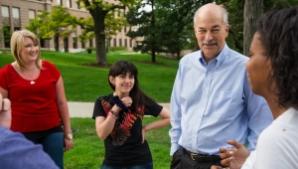About Us Menu
Principled Pluralism

A distorted and dangerous definition of pluralism is emerging in the academy. In a front-page article last June, entitled “Colleges and Evangelicals Collide on Bias Policy,” the New York Times reported several instances where new university non-discrimination policies – designed to foster diversity - are actually making campuses less inclusive.
At issue on campuses such as Bowdoin, Tufts, Vanderbilt and the California State University system is the right of faith-based student groups to use doctrinal criteria to select leaders. Accused of “religious discrimination,” these groups are at increasing risk of being derecognized on campus.
Aspen Institute Report
A year ago, the Aspen Institute addressed such concerns in a report entitled “Principled Pluralism.” Co-chaired by Madeleine Albright and David Gergen, the 25 member “Inclusive America Project” panel included university and seminary presidents, media thought-leaders, professors and social service providers. It was my great privilege to serve with senior religious leaders from various faith communities - Jewish, Moslem, Sikh, Humanist and Christian.
Together, we adopted the phrase “principled pluralism” to articulate two big ideas. First, we embraced the right of diverse religious traditions to self-define and to disagree – even adamantly - on matters of theology. Second, we affirmed a deep commitment to pursue the common good together in higher education, youth services, media and government. The first point distinguished us from those who seek to blur or mitigate religious doctrines; the second from those who seek to foster ill-will amongst faith communities.
The report specifically recommended that “institutions of higher learning should make the study of religious diversity a priority, and create campus environments that promote honest respectful exploration among students of the variety of religious beliefs.” I was particularly impressed by Harvard Professor Robert Putnam’s conclusion that religious diversity can (counter-intuitive as it may seem) actually be a source of social cohesion.
Universities as Hosts of Principled Pluralism
Principled pluralism encourages the academy to be a place where conflicting narratives and ideologies vie with each other freely and openly. As a former dean, I recognize that this involves a measure of messiness and discomfort for all involved. Every time a less-than-popular voice is silenced, students are denied an opportunity to engage the real world around them. Part of entering the adult world is the ability to process differing world views.
It is therefore of great concern that faith-based student groups are finding it increasingly difficult to find a seat at the table on some campuses. Their choices are being limited to: (a) allowing students who know nothing about their faith to lead their groups as a price for recognition, (b) compromising their integrity by signing off on university policy while secretly intending to choose leaders who abide by the tenants of their faith, or (c) refusing to sign the agreement and lose recognition.
As expressions of devout faith become less palatable at some institutions, will these student groups be allowed to freely associate, self-select leaders and share their beliefs with others? Or will campuses become - in the words of former Yale Law School dean, Anthony Kronman - increasingly “intellectually and spiritually frozen?”
The emerging false pluralism stifles religious expression, labels leadership selection based upon orthodoxy and orthopraxy as “religious discrimination,” redefines freedom of association as “exclusionary,” and condemns the sharing of one’s faith with non-adherents as “proselytizing.”
When pluralism is wrongly defined, nonsensical policies result. In the California State System, for example, sororities and fraternities are explicitly exempted from gender discrimination in selecting leaders, while faith based groups are not granted a similar religious exemption. (Of course, the underlying story behind such treatment – as told in a recent Atlantic article - is the political and economic power of Greek alumni).
My point is not to slam sororities and fraternities. To the contrary, I concur that they should be allowed to have female and male leaders, respectively. Likewise, Phi Beta Kappa should have smart leaders. The Young Democrats should have politically progressive leaders. And, in this same spirit, faith based groups should have religious leaders. It is telling that the conservative National Review and the liberal Mother Jones concur on this point.
University administrators bear great responsibility to ensure that principled pluralism thrives in their environs. The degree to which they provide – or fail to provide – truly open public forums will determine how our culture engages such issues in the future. How they define pluralism today will establish a cultural template for a whole generation.
A slightly different version of this article was published by the Huffington Post